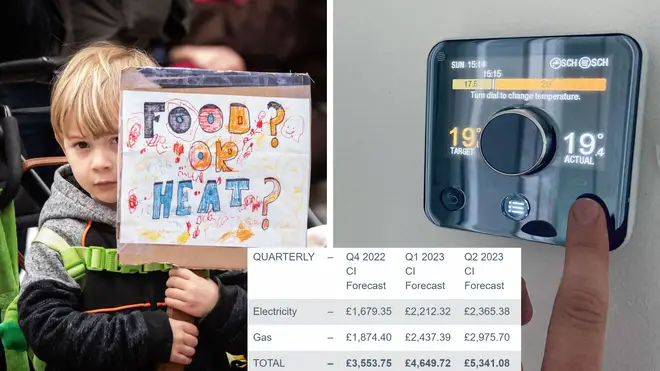
Matthew Wright 7am - 10am
22 August 2022, 14:52 | Updated: 22 August 2022, 15:48

Energy bills are expected skyrocket to more than £5,300 annually by April next year, according to a new economic forecast.
Energy consultancy Cornwall Insight put the huge sum in their final forecast ahead of October's price cap on Friday.
While the predictions for the October cap have remained largely steady over the past two weeks, forecasts for 2023 have risen, with the latest predictions showing that by April 2023, the price cap will hit £5,341.08 per year.
The calculations reflect a 15% increase in wholesale prices in the last week, and the firm added that prices are subject to "significant change both up and down".
The price is then expected to fall later in 2023, but will remain high at a predicted £4,767 in July and £4,807 in October.
The price cap is not a maximum limit on consumer energy bills, but rather a cap on how much suppliers can charge per kWh of energy used and a maximum daily standing charge.
Dr Craig Lowrey, Principal Consultant at Cornwall Insight said: "While the energy price cap rise in April was already an unprecedent increase in domestic consumer energy bills, our final predictions for October are truly concerning.
"With the cost-of-living spiralling and households looking at an energy bill rise of over £1,500 equivalent per year, it is difficult to see how many will cope with the coming winter.
"Over the past few weeks, we have seen many public discussions on how consumers will be best supported with their bills.
"The relative merits of each policy are a matter of debate, however what is certain is the need for a comprehensive energy support plan, one which provides relief for consumers not just for this cap rise or the next, but which looks to deliver enduring support for consumer bills.
"The energy crisis is not something which can be solved with hastily pulled together, short-term policies that yield a percentage decrease here or a few months relief there.
Read more: Inflation to hit 18% in January as fears grow over worsening cost of living crisis

GP explains why energy bill plan is a 'non-starter'
"Although such policies may help to solve today’s problems, they risk being sticking plasters for a much deeper and longer-term problem.
"The energy market remains an incredibly volatile place, while the observation window for October’s cap has closed, and our predictions for the last quarter of 2022 are final, 2023 is a different story.
"Forecasts can, and will, rise and fall by hundreds of pounds over the coming months, as market conditions continue to change. However, one thing is certain, the cap is not protecting – nor will it protect – consumers from these high prices.
"The next few years will likely be overshadowed by this energy crisis, and there will need to be a serious review of how to deliver energy policy that helps households and businesses alike."
Spiralling energy bills are set to cripple families over winter, with the government being warned that extra support will be needed for Brits in coming months.
In another bow for Brits, predictions today show that inflation is set to hit 18% in January as fears grow that the cost of living crisis will worsen.
Boris Johnson is set to use his final fortnight in office to highlight measures to address the crisis.
A spokeswoman said the government is "focused on supporting people with the cost of living and making sure that those who are eligible for the £37 billion of support that's already available through our phased-in plan are availing themselves of it."
But no more help is expected to be announced before the new prime minister takes office, with major policy decisions postponed until that point.